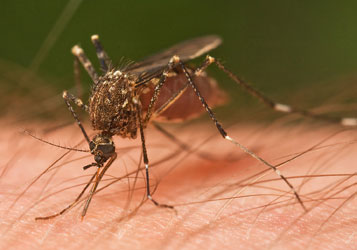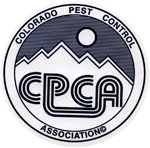Pest Library - Mosquitos

Mosquito and mosquita (from the Spanish meaning little fly) is a common insect in the family Culicidae (from the Latin culex meaning midge or gnat). Mosquitoes resemble crane flies (family Tipulidae) and chironomid flies (family Chironomidae), with which they are sometimes confused by the casual observer.
Mosquitoes go through four stages in their life cycle: egg, larva, pupa, and adult or imago. Adult females lay their eggs in water, which can be a salt-marsh, a lake, a puddle, a natural reservoir on a plant, or an artificial water container such as a plastic bucket. The first three stages are aquatic and last 5-14 days, depending on the species and the ambient temperature; eggs hatch to become larvae, then pupae. The adult mosquito emerges from the pupa as it floats at the water surface. Adult females can live up to a month - more in captivity - but most probably do not live more than 1-2 weeks in nature.
Mosquitoes have mouthparts which are adapted for piercing the skin of plants and animals. They typically feed on nectar and plant juices. In some species, the female needs to obtain nutrients from a "blood meal" before she can produce eggs. There are about 3,500 species of mosquitoes found throughout the world. In some species of mosquito, the females feed on humans, and are therefore vectors for a number of infectious diseases affecting millions of people per year.
West Nile Virus: What causes it?
The infection is transmitted by mosquitoes. They acquire the virus after biting an infected bird, and then they bite us. In 2006 there were 4269 cases of West Nile Virus with 177 deaths. Virus transmission occurs mostly during warm weather, when mosquito populations are active. In the northern part of the country, infections occur mainly in the summer and early fall, but in the warmer southern regions, the virus can be transmitted all year. The incubation period - or the period between when you're bitten by an infected mosquito and the appearance of signs and symptoms of the illness - ranges from two to 14 days.

Signs and Symptoms:
Most of the time, infection with West Nile virus makes people mildly sick. A person may get flu-like symptoms such as fever, headache, body aches, and sometimes skin rash and swollen glands. More severe infection can result in encephalitis, which includes symptoms of severe headache, high fever, neck stiffness, disorientation, and sometimes convulsions. It's rare but, severe West Nile infection in healthy, younger people can be fatal, but the elderly are at greatest risk for severe complications.
How to know if you have West Nile Virus:
The virus causes an infection that can lead to inflammation of the brain (swelling) much like encephalitis, or swelling of the spinal cord, or the tissues surrounding it and the spinal cord like meningitis. If the doctor thinks you might have the virus, they will ask you questions to see if you were at risk for getting the virus. If you have symptoms that the virus is affecting the brain and spinal cord a blood test will be done to see if you have antibodies to the virus. And sometimes a Lumbar Puncture (spinal tap) is done to look for the virus.
Treatment for the Virus:
There is currently no specific treatment for the virus. Mild infections go away on their own. But severe cases of encephalitis are treated with supportive care in a hospital. This care involves helping the body fight illness on its own. It often is used when no specific treatment exists for an illness, as is the case with some viruses. Treatment for West Nile virus can include receiving fluids through IV, or help with breathing using a ventilator, and prevention of another infection like pneumonia.
- Prevention of West Nile Virus:
- The best way to prevent West Nile virus and other mosquito-borne illnesses is to avoid exposure to mosquitoes and eliminate mosquito-breeding sites.
- Drain standing water in your yard and patio. Mosquitoes breed in pools of standing water.
- Unclog roof gutters, clean them of water and wet material.
- Empty unused items that hold water like swimming pools.
- Change water in birdbaths at least weekly.
- Be aware of any sick or dying birds in your yard and report them to your local health department.
- To reduce your own exposure to mosquitoes:
- Avoid unnecessary outdoor activity when mosquitoes are most active, like at dawn, dusk and early evening.
- Wear long-sleeved shirts and long pants when you go into mosquito-infested areas.
- Apply mosquito repellent to your skin and clothing. You can use items with DEET, Picaridan and Oil of Lemon Eucalyptus as repellents. Choose DEET concentrations based on the hours of protection you need - the higher the percentage the longer the repellent will work.
- Citronella candles can prove some usefulness if used properly.
- Keep in mind that some repellants can be toxic, and use only the amount needed for the time you'll be outdoors. Don't use DEET on the hands of young children or on infants under 2 months of age.
- For those spending time outdoors and choose not to use a repellent, use mosquito netting to offer you some protection.


